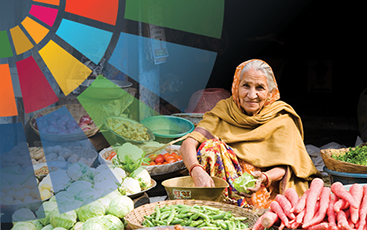One of the central aims of the 2021 UN Food Systems Summit (UNFSS) is focusing global attention on how transforming our food systems can contribute to meeting the Sustainable Development Goals—particularly Goal 2 and its key component of eliminating hunger by 2030.
The idea of a global fund dedicated to eliminating hunger has been put forward by several international leaders, such as Pope Francis. UNFSS Action Track One has taken an important step in this direction, championing a Zero Hunger Fund.
A new brief published by UNFSS Scientific Group builds on this idea, proposing a Zero Hunger Alliance & Fund. Its aim is to significantly increase funding to defeat hunger, and to serve as an international mechanism to assist the participating countries in the development and implementation of their zero hunger plans.
Several other recent initiatives—the Global Agriculture and Food Security Program (GAFSP), the Poverty Reduction Strategy Papers (PRSPs), and Gavi, the Vaccine Alliance—offer important lessons on how to structure such a venture.
They show the importance of setting clear and measurable goals, and supporting country-owned, medium-term, integral programs. They also highlight the need for using scarce development funds strategically to leverage far greater financial resources, rather than the direct financing of individual, isolated projects. Finally, they underline the relevance of flexible public-private institutions with strong coordinating and operational capabilities.
As part of a broader plan to achieve SDG2 by 2030, the brief proposes an increase of $15 billion annually in international development funds dedicated to agricultural and rural development, food and nutrition security, and environmental aspects of food systems—effectively doubling current spending levels.
Of that amount, $2 billion—funded by global donors—would be used to finance the Zero Hunger Alliance & Fund, with the capacity to support, both institutionally and financially, country-owned and country-coordinated programs to end hunger.
The program would also include an effort to mobilize an additional $500 million per year from the private sector, with targeted commitments from at least 50 companies in food and other sectors.
To expand the financial resources available, the brief also suggests dedicating 2% of the new allocation of IMF Special Drawing Rights (SDRs) (or $13 billion of the total of $650 billion) to create a fund to guarantee interest payments of new “zero hunger bonds” and “zero hunger green bonds” issued by countries participating in the Alliance. Those instruments would be perpetual bonds, with a floating rate, capped at an agreed maximum. This means their long-term impact should be substantially greater than the $13 billion allocation—depending on how the guarantees on interest payments are structured and maintained over time, they would multiply by a factor of more than 10 the value of the SDRs directly allocated to this initiative. Of course, the same idea can be applied to other similar instruments, such as a “pandemic recovery bond.”
In addition to eliminating hunger by 2030, the Zero Hunger Alliance & Fund, through specific policy interventions and investments supported at the country level, would help achieve other crucial nutritional and environmental objectives, which will be monitored and documented.
The Zero Hunger Alliance & Fund would be a public-private partnership, with personnel seconded from international organizations focusing on poverty, food security and nutrition issues. They would work in close cooperation with teams of partners in participating countries—small groups of high-level officials with the relevant authority to design national initiatives and to mobilize the financial and institutional resources needed to implement them. One approach that deserves special consideration is the use of social safety nets that combine productive, environmental, nutritional, and financial inclusion components.
The fund would be used to cover operational costs; hire technical and operational experts to support the countries in defining the programs and mobilizing the human, financial, and institutional resources to carry them out; facilitate the issuance of zero hunger bonds and other financial support; and eventually to finance some interventions directly.
We know that the establishment of a new global hunger fund is not without risks. Potential public and private sector contributors may suffer “donor fatigue” when confronted by yet another initiative. Beyond that, some countries may not choose to participate, or some that do may not have the necessary capabilities, even with the support of the Alliance, to coordinate and sustain the effort to eliminate hunger.
But the institutional arrangement outlined here has several important advantages. It has a flexible public-private institutional structure, and it supports participating countries as they implement country-owned, country-coordinated, integral programs. It also focuses on the single and measurable objective of ending hunger by 2030, while at the same time—given the type of agricultural technologies and environmental interventions supported—contributing to crucial objectives related to climate change mitigation and adaptation. The fund allows for the mobilization of a significantly larger volume of funds than those directly allocated to the Alliance. And, by relying on personnel from existing organizations, it reduces the risks of creating another permanent international bureaucracy.
Ending hunger requires political will and institutional capacity at the national level, but ultimate success also requires that national efforts be supported at the international level. That goal is within reach, and a Zero Hunger Alliance & Fund can play a central role in meeting it.
Eugenio Díaz-Bonilla is Head of IFPRI’s Latin American and Caribbean Program.







